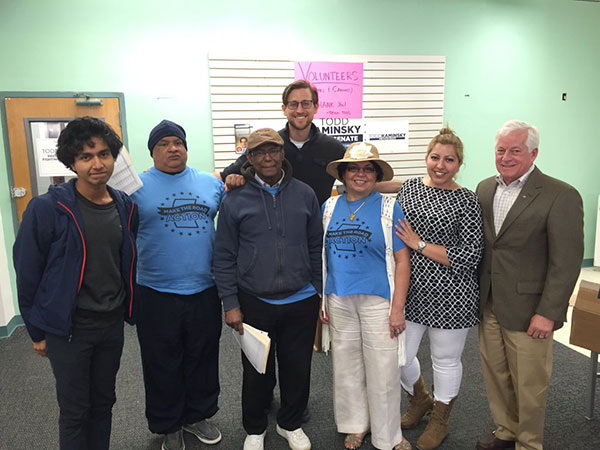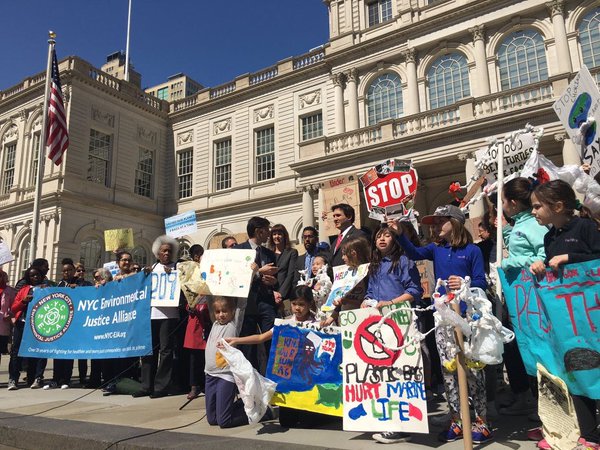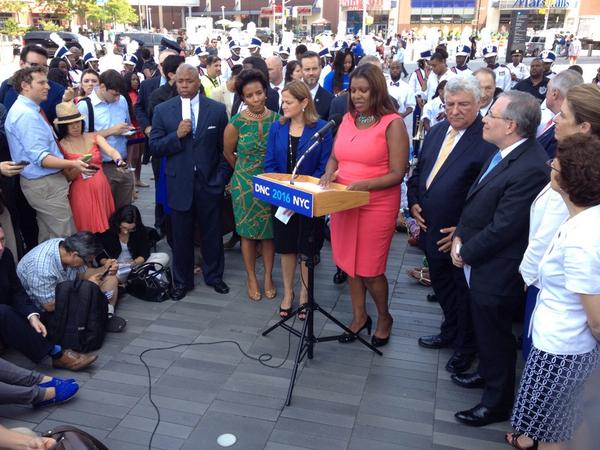Hope in the State Senate

Make the Road Action volunteers for Todd Kaminsky
Last Tuesday, many New Yorkers were focused on the presidential primaries, but there was another election that may be even more important for communities like mine. In a special election for State Senate in Nassau County, Democrat Todd Kaminsky won a seat long-held by former Republican Sen. Dean Skelos.
This result was key for three reasons.
First, it showed the importance of the votes of Latinos, immigrants, and people of color outside of New York City.
As a black Latino immigrant living on Long Island, I’ve seen first-hand how the region has changed in recent years away from being the overwhelmingly white suburban area it was once. Now, as reported by Newsday, it is likely that communities of color were the key difference in the victory of Todd Kaminsky by a relatively small margin, demonstrating the growth of our community on Long Island and our power. While we still have much work to do to continue registering and mobilizing voters, last Tuesday’s result shows that we are becoming more aware about the importance of voting in local and state elections, which often have more direct impact on our lives than federal contests. Communities of color—particularly Latino and immigrant communities—are growing in population and so too is our political weight.
Second, this choice will be important in addressing one of the main barriers blocking progress for our communities: the state Senate.
Many of the abuses suffered by our community in New York stem from state laws that fail to protect us. in many cases, we are even targeted. These laws—weak rent regulations, lack of police and criminal justice reforms, restrictions on accessing financial aid, and more—exist because for years we have had no one in the Senate from Long Island who represents us at the time of decision-making. Make the Road Action, of which I am a member, backed Todd Kaminsky because he committed to supporting our community—for example, by raising wages, expanding healthcare access, and ensuring higher education access. Meanwhile, the Republican campaign mailed anti-immigrant propaganda to excite ultra-conservative voters with a message akin to Donald Trump’s.
We will continue to fight on priority issues for our community—to pass the DREAM Act, strengthen rent laws, pass criminal justice reform, and more—and we are confident that Senator Kaminsky will be there with us.
Third, Senator Kaminsky's victory could be the first step in changing the balance of power in Albany.
Through November, Republicans are likely to maintain control of the Senate through an alliance with the Independent Democrats (IDC). But this special election showed that progressive candidates themselves are able to succeed against conservatives on Long Island—the first time we’ve seen that in years—and we expect to have several close state Senate elections in our region in November. With only one or two more wins, Democrats could take control of the state Senate, which would give us the opportunity to pass new laws that protect workers, young people who want to study, tenants, LGBTQ immigrants—in short, our entire community.
This election showed the growing power of our community. Now we must continue to build our strength and ensure that we are prepared to fight for our rights and vote in November, when the entire state Legislature is up for election.
***
Frank Sprouse-Guzman is a member of Make the Road Action and a Bay Shore resident. On Twitter: @MaketheRoadAct.
***
Have an op-ed idea or submission for Gotham Gazette? Email This email address is being protected from spambots. You need JavaScript enabled to view it.
Time to Cut the High Cost of the Free Plastic Bag

A rally for the plastic bag fee bill (photo via @bradlander)
It’s a fact: people who live in America’s most polluted environments are most commonly people of color and poor. New York City is no exception; thanks to decades of unfair policies, over 75 percent of the city’s entire solid waste stream is now processed in a handful of low-income neighborhoods and communities of color in the outer boroughs. Consequently, these communities bear the disproportionate burden of high truck traffic, diesel fuel emissions, unsanitary conditions, and noise pollution.
Spearheaded by communities of color living in environmentally overburdened areas, the Environmental Justice Movement emerged to collectively protect the places where we live, work, and play. Now, we’re voicing our support, from Brooklyn to the Bronx, for legislation to drastically reduce the number of plastic bags in our waste stream by attaching a 5 cent charge.
What do “free” plastic bags have to do with environmental justice? The bag that many of us were given today is just one of 9.37 billion plastic bags that make their way into the city’s waste stream every year – assuming it doesn’t end up polluting our waterways. A whopping 91,000 tons of plastic bags are hauled on diesel trucks for processing at transfer facilities clustered in industrial waterfront neighborhoods, including North Brooklyn, Sunset Park, and the South Bronx. Our communities, more than all others in New York, suffer the noxious fumes and noise pollution, the traffic congestion and unsafe streets, the high rates of asthma and respiratory problems, and the general neighborhood blight caused in part by our city’s love affair with this icon of disposable convenience.
Faced daily with these burdens, low-income New Yorkers of color already know the high cost of “free” plastic bags.
The legislation pending before the City Council, Intro. 209, is an integral part of the city’s larger zero waste goal to divert 90 percent of our waste stream from landfills by 2030. Meeting this ambitious target would improve quality of life for thousands of New Yorkers living in environmental justice communities near waste facilities. The City Council worked alongside advocates to draft a bill that addresses the concerns of low-income New Yorkers.
The bill provides exemptions for customers using SNAP, WIC benefits, and other transactions at emergency food providers. It also includes provisions for community outreach and the distribution of free reusable bags in low-income communities.
Grassroots, community-based environmental justice advocates have a long history of finding innovative solutions to proactively address the inequitable environmental burdens that we face. Int. 209 is not a cure-all for our solid waste problems – we have a long way to go to achieve a truly equitable solid waste system. But a law on the books showing the city working to meet its waste reduction goal is no doubt a big step in the right direction. By reducing the amount of single-use bags in our communities, the city can help lessen the burden of unnecessary waste and trucks in our environment, and improve the neighborhoods of low-income communities and communities of color.
***
Eddie Bautista is the executive director of the New York City Environmental Justice Alliance, where Priya Mulgaonkar serves as policy organizer. Mark Winston Griffith is the executive director of the Brooklyn Movement Center, a community organizing body in Bedford-Stuyvesant, Crown Heights and the surrounding area.
***
Have an op-ed idea or submission for Gotham Gazette? Email This email address is being protected from spambots. You need JavaScript enabled to view it.
James Takes Softer Stance on Atlantic Yards

James (at podium) & Cumbo (in green) at Barclays Center (photo: Azi Paybarah)
When Public Advocate Letitia (Tish) James served as City Council Member for the 35th District in Brooklyn, from 2003 through 2013, she was a vocal, high-profile opponent of the Atlantic Yards megaproject, as reflected in the 2011 documentary Battle for Brooklyn.
James was a plaintiff in two lawsuits challenging the willingness of government authorities to relax deals with developer Forest City Ratner, and promoted another lawsuit filed by Brooklynites who went through a coveted pre-apprenticeship training program, run by a Forest City community partner, but didn't get expected union cards and jobs.
In her successful 2013 campaign for citywide office, James even criticized mayoral candidate Bill de Blasio, generally an ally, regarding his support for the project, which includes the Barclays Center and 16 towers (of which four are now rising), set to house 6,430 apartments, of which 2,250 are "affordable."
Since becoming public advocate, James, understandably, has paid far less attention to the project, which in 2014 was renamed Pacific Park Brooklyn after Chinese developer Greenland Holdings bought a majority stake, excepting the arena and one tower. James also joined local officials calling for the 2016 Democratic National Convention to come to the Barclays Center.
Still, it was surprising to learn, from New York Daily News Sports I-Team reporter Michael O'Keeffe, the main contributor to a four-part series on Atlantic Yards/Pacific Park that began April 11, that James would talk up the project at the behest of a developer she's long criticized.
As O'Keeffe told it, at about 43 minutes into a podcast, published April 22, in which we both appeared, months earlier, as he began looking into Atlantic Yards,, he reached out to James, but was eventually told she didn't want to comment.
As his publication date approached, and after the developer likely knew there was critical coverage coming about issues like sexual harassment by construction workers, low pay for arena staff, and neighborhood disturbances, O'Keeffe "got a call out of the blue" from James.
While James told him she's not in touch with the grassroots, she said, as O'Keeffe put it, that "she doesn't really hear a lot of complaints from residents, what she hears is a lot of excitement about the possibility of affordable housing."
O'Keeffe asked her if the developer - whose local face remains Forest City Ratner - asked her to call, and she said yes.
James apparently did not know the specifics of O’Keeffe’s coverage, such as the harassment by construction workers and arena attendees toward a 23-year-old African-American woman. (James is the first woman of color to hold citywide office in New York.)
On the podcast, I speculated that James was thinking about a 2021 mayoral run, as Atlantic Yards/Pacific Park criticism has less weight, and friendly relations with powerful developers can be helpful.
But her posture - perhaps a lapse or poor political judgment - still seems strange. (She declined comment, in response to my queries.) Had James looked on my blog or sources like Atlantic Yards Watch or Instagram (see the #bciza tag), problems faced by arena neighbors have been amply documented.
It's precisely her responsibility, as Public Advocate, to serve as a watchdog over the city agencies that have failed to curb, say, illegal parking or construction activities that spill out blocks from the project.
While James understandably supports "affordable housing," the devil's in the details. James was critical of some of that housing, for example, challenging the developer regarding the percentage of family-sized units, lower than promised, in the first tower under construction, the lottery for which just opened up.
She did appear at the December 2012 groundbreaking for that tower but was not quoted in any press release, and has stayed out of December 2014 and June 2015 press releases saluting two "100% affordable" towers. In other words, she had until recently kept her distance.
Beyond a focus on her next campaign, perhaps James has been influenced by Michelle de la Uz of the Fifth Avenue Committee, a Brooklyn nonprofit, who was de Blasio's nominee to the City Planning Commission, and remains James' representative.
De la Uz in 2014 helped negotiate a new timetable to deliver the 2,250 Atlantic Yards affordable housing units by 2025 rather than 2035. (That's faster than the previously extended timetable, of 2035, but a ten-year buildout had been touted when the project went through approvals in 2006 and then 2009.)
That was progress, but de la Uz downplayed the fact that two "100% affordable" towers that came out of that deal skewed toward middle-income households earning six figures and were less affordable - in terms of incomes served - than the developer long pledged. De la Uz and allies in the BrooklynSpeaks coalition had actually once criticized that original configuration as not affordable enough.
Today, de la Uz and allies likely have James' ear more than those bearing the brunt of Atlantic Yards impacts. But the Daily News series, as well as my coverage of a public meeting in mid-April, detailed continued frustration from neighborhood residents, as the harassment victim pointed out how state officials, in a report to an Atlantic Yards/Pacific Park advisory board, had downplayed the harassment. The developer did say it would roll out a color-coded ID system to make it easier to recognize construction workers.
Similar political calculations may be at play for James's successor on the Council, Laurie Cumbo, who in the wake of the Daily News series was curiously silent. After all, Cumbo chairs the Council's Committee on Women’s Issues and has regularly spoken out about issues of sexual violence, including those affecting women and girls in Nigeria.
During her Council campaign, Cumbo did criticize Atlantic Yards, but soon adopted a wishy-washy posture; she's regularly praised the below-market housing without reference to its actual affordability. Had a less powerful constituent than the Atlantic Yards/Pacific Park developer been connected to the harassment, I have to think Cumbo would have been less cautious.
Though Cumbo did not respond to an April 18 request for comment, after she was informed that this article was in the works, she sent a statement Wednesday that, among other things, cited her work on women’s issues, including “legislation that will raise awareness to prevent sexual harassment and assault.” She noted that venues in the district had brought more traffic and thus quality of life issues, and that in recent weeks there has been “greater visibility on the need to address sexual harassment within our community.” She said that New Yorkers face “cat calls, lewd gestures, inappropriate language and unwarranted comments about the physical characteristics of their bodies” and that “in the City of New York, these acts will not be tolerated."
Her statement, interestingly enough, didn’t acknowledge the victim but indicated respect for the developer. “I want to acknowledge Ashley Cotton, SVP of External Affairs, Forest City Ratner Companies for working with the NYPD, Barclays Center, contractors, and unions to implement several measures including a color-coded identification system for its workers to improve accountability and a guest code of conduct for Islanders games to enhance public safety,” Cumbo wrote. “These preliminary steps are indicative of our collective commitment to fostering a safe environment for women, the LGBTQ community, and countless others who deserve to freely commute.”
Fewer than 90 minutes later, Cumbo circulated to her mailing list an announcement about the application process for 461 Dean, the first Atlantic Yards/Pacific Park affordable housing tower.
***
Brooklyn journalist Norman Oder writes the watchdog blog Atlantic Yards/Pacific Park Report.
***
Have an op-ed idea or submission for Gotham Gazette? Email This email address is being protected from spambots. You need JavaScript enabled to view it.




